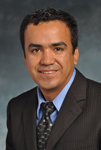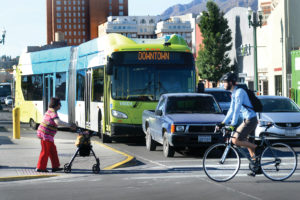Just about everyone these days is connected to the world at large—thanks to technology. It’s because of that technology that our smartphones have the ability to help El Paso’s Sun Metro (the city’s public transportation service) and city planners make the best choices about new routes, additional stops, and other transit decisions that could improve system efficiency in the most cost-effective way possible. That helps cities like El Paso stretch finite resources and public tax dollars to achieve the greatest return on investment for their constituents.
An innovative research project is now under way by a Center for International Intelligent Transportation Research (CIITR) team using Media Access Control, or MAC, address scanners. In this initial project, our team is collecting data on two different Sun Metro transit routes by using these scanners. The MAC scanners are able to collect Origin-Destination (OD) data via Wi-Fi and Bluetooth® devices, like smartphones. OD information is then used to determine travel patterns of transit users. The data is crucial in making future transit decisions. By learning travel patterns, Sun Metro (and potentially any other regional transit agency) can better plan staffing, bus maintenance, and other operational details of its services to best serve El Paso regional residents.
Without this technology, transit agencies rely on passenger counts, surveys and other methods that are often expensive and not always accurate. The last OD effort by Sun Metro was in 2012, and it only included a limited passenger count by segments, rather than stop-by-stop information.
Our CIITR pilot study is hopefully just a first step. Once this initial project is complete, we’ll be able to determine the accuracy of this wireless data. And if everything turns out the way we think it will, our methods can be used to gather much more vital data, which is needed to help ensure the system is meeting the needs of the community.
David Galicia is an assistant research scientist with TTI’s Center for International Intelligent Transportation Research.


